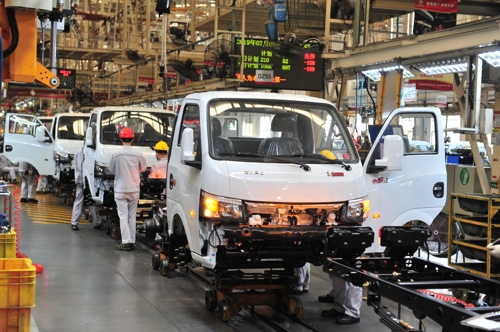
AsiaNet 80087
(XIANGYANG, China, Aug. 16, 2019 AsiaNet=연합뉴스) Recently, the intelligent green coating production line of Fengshen Xiangyang Automobile Co., Ltd., the largest energy saving and emission reduction project in Xiangyang, a city in central China's Hubei Province, was put into production, according to the Information Office of Xiangyang City. With a total investment of 1.1 billion yuan, the project has introduced 11 international top-ranking automatic spraying lines from Japan and France, mainly including three major processes -- polishing, painting and finishing.
The coating utilization rate has been increased by 10 percent, waste gas treatment efficiency increased to 99 percent, volatile organic compounds emissions reduced by 70 percent, electricity consumption reduced by 17 percent, total energy consumption reduced by 9 percent. After the completion of the project, 1,700 tonnes of standard coal and 580 tonnes of toxic gas will be saved annually.
Xiangyang has sought better development through eliminating backward production capacity, streamlining complicated government review process, and cutting emissions and pollution.
All the reduction measures have strengthened the city's development core and promoted its development quality.
In the city's Yuliangzhou riverside area, 40 kitchen waste collection and transportation vehicles stop by over 2,000 restaurants everyday, entering 350 tonnes of sludge into the disposal system, generating fuel gas enough for 400 taxis and organic fertilizer for dozens of street parks and greenbelts across the city.
"I could barely imagine such a scene years back," said Mei Liyuan, director of a local energy company in his office, with a view of endless trees and green hills along Hanjiang River that runs across the city.
Ren Xingliang, from the standing committee of the city's people's congress, said Xiangyang has experienced a rapid growth over the past decade, with its economic aggregate topping 400 billion yuan (56.6 billion U.S. dollars). However, the "growing pains" are also huge, with its worsening environment being the most prominent.
"Because of it, green development has been given top priority in Xiangyang's industrial decompression," Ren said.
Over the years, a 11,000-square-km "China Organic Valley" that takes up 56 percent of the city has been planned, followed by shutdown or relocation of more than 600 farms, polluting companies and unlicensed wharves within 1 km of the banks along Hanjiang River. Over 30 km of banks, as well as dozens of hectares of land were vacated for greening.
Thanks to a series of measures, the city's environment has been improved substantially. Every summer night, citizens often gather in a pleasant green park by the river that used to be a dump just a year ago. The ecological bonus brought by "reduced development" is benefiting everyone in the city.
Xiangyang used to be an important base for China's inland construction during 1960s, with traditional resource-consuming industries dominating the city's economy.
"Time has changed. The new development path requires us to cut backward capacities and strengthen what must be strengthened," said Yang Zhiguo, chief economist at the city's economy and information technology commission.
An wave of intellectualized reconstruction and green manufacturing based on more than 20 indicators such as level of resource utilization, labor productivity and science and technology contribution rate has swept almost every factory and sector of the city's industry, according to Yang.
At the same time, Xiangyang has set new energy and intelligent network connection vehicles as its developmental direction, continuing to extend the industrial chain. In Xiangyang High-tech Zone, more than 40 enterprises and institutes are engaged in the research and production of new energy vehicles.
In 2018, the output value of new energy vehicles above the designated size has reached 23.3 billion yuan. In April, Wuhan Jinhuang Industrial Group Co., Ltd. signed an agreement with Xiangyang to invest 1 billion yuan in the first phase of the project to build a hydrogen fuel power supply and to produce hydrogen-powered vehicles.
After the completion of the project, the production capacity of Xiangyang's hydrogen fuel power supply system will reach 100,000 sets, and a total industrial chain development scale will top 30 billion yuan.
Last year, the city's energy consumption per unit of GDP and carbon dioxide emission dropped by 4 percent and 4.3 percent respectively. In the meantime, strategic emerging industry is surging forward.
In the first half of 2019, the city's high-tech manufacturing output increased by 42.6 percent year on year, while output of electronic information and new-energy automobile saw year-on-year increase of 36.5 percent and 32.8 percent.
Besides the ever-transforming industry structure, the city government has kept reforming itself. Streamlining administrative process has made huge progress since 2018.
It has only taken 81 days for a 700-million-yuan project to be put into production since the day of contract signing.
"It's been a highly effective process. The local government always thought ahead from factory lease to production permit," said Yang Tao, general manager of the intelligent equipment company.
In addition, a series of favorable policies have been implemented to help companies to apply for more tax cut, ease liquidity pressure, and shorten process for start-ups. The overall customs clearance times for import and export have also been slashed by 41.5 percent and 75.9 percent, respectively.
Despite the sharp decrease of exports to the United States, Xiangyang's foreign trade export still saw a year-on-year increase of 23.5 percent from January to May.

Source: The Information Office of Xiangyang City
Image Attachments Links:
http://asianetnews.net/view-attachment?attach-id=342832
http://asianetnews.net/view-attachment?attach-id=342837
[편집자 주] 본고는 자료 제공사에서 제공한 것으로, 연합뉴스는 내용에 대해 어떠한 편집도 하지 않았음을 밝혀 드립니다.
(끝)
<저작권자(c) 연합뉴스, 무단 전재-재배포 금지>
관련뉴스














